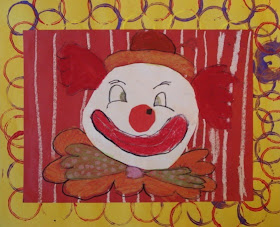My Grade 2 students recently finished their clown portraits which is part of their Portraiture unit. We've been creating portraits in different medium, using colour to express different moods.
In this one, obviously we're trying to create happy moods using bright colours. However, if you're like me and find clowns incredibly creepy, then these are not happy! lol
I found the original lesson HERE on the fantastic Kids Artist blog.
Students first chose a coloured piece of 9x12" construction paper. Then, they drew and cut an oval or a circle onto plain white paper. (This is when you hear all the students say "An oval is soooo haaaard to draw!!") hahaha!
They cut this out, glued it onto their construction paper, and, using a black marker,
drew the face and all the details.
They coloured in the clown using either oil pastels or construction paper crayons.
(NOTE: I keep my oil pastels and chalk pastels in THESE amazing bowls from the children's section at IKEA. They're the perfect size (wide and low and non-tippy).
Two students share a bowl. They're only $2 for 6 bowls!!
Some students cut out a big red nose from paper.
On a separate sheet of 12x18" construction paper, students learned about mono-printing. They used a toilet paper tube and dipped it into tempera paint, and stamped it around the border.
Once the borders are dry, glue the finished clown portraits onto it using white glue.
This clown below is all kinds of amazing!!!!!

































































